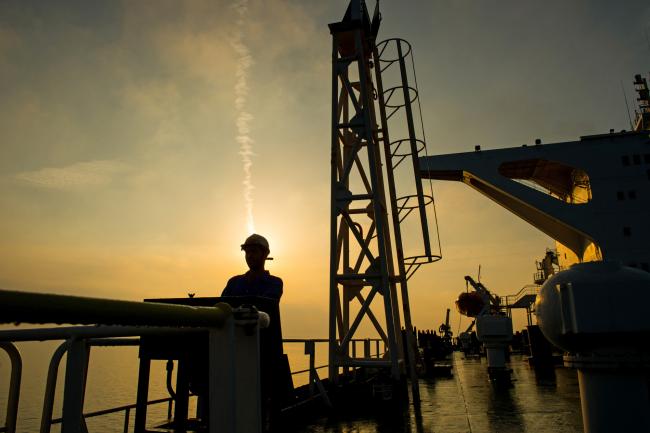(Bloomberg) -- Just over a year ago, OPEC+ ministers gathered in the opulent Ritz-Carlton hotel in the Saudi city of Jeddah and Khalid Al-Falih, the kingdom’s oil minister, pushed to tighten the oil market.
"We have seen prices significantly higher in the past, twice as much as where we are today," Al-Falih said in April 2018 as Brent traded at $73 a barrel.
Fast forward a year and little has changed, at least on the surface. Speaking at the same hotel this weekend, Al-Falih sent a very similar message -- OPEC and its allies need to maintain production cuts to reduce global inventories. While he avoided talking about prices this time, the subtext was clear: oil can rise further.
As oil traders size up the second half of 2019 -- weighing plunging production in Venezuela and Iran against U.S. shale’s seemingly endless boom and a deepening trade war -- they will bear in mind how last year panned out.
Under pressure from both U.S. President Donald Trump and Russian leader Vladimir Putin, Al-Falih did a U-turn. He admitted price rises had gone too far and engineered a production increase at OPEC’s next full ministerial meeting in June.
Saudi officials say in private this year is different, but many oil investors think there’s a risk the kingdom will retreat once again.
Oil prices gained strongly in the four months of 2019, reaching $75 in April as Venezuela’s oil industry neared collapse and President Donald Trump tightened the screw on Iran, but since then the rally’s stalled.
In the first few hours after the Jeddah meeting, Brent futures in London jumped 1.7 percent to $73.40 a barrel only to give most of the gains later on Monday morning.
"It is clear that Saudi Arabia is keen to protect the downside in oil prices, despite growing concerns about falling Iranian and Venezuelan supplies," said Amrita Sen, chief oil analyst at Energy Aspects Ltd. in London.
Like last year, Russia is already signaling a policy shift. OPEC+ may need "to tweak" the current production deal when it meets next month, Russian Energy Minister Alexander Novak said Sunday in an interview with Bloomberg TV. One option on the table is "removing the over-compliance" with current targets, Novak said, a move that would effectively ease output cuts in the second half of the year.
Novak’s boss may also want a say. At last year’s annual St. Petersburg International Economic Forum (SPIEF) in June, Putin said Russia "wasn’t interested in an endless rise in the price of energy and oil."
The 2019 edition of SPIEF is scheduled for June 6 to 8 and again the Russians appear happy with an oil price somewhat lower than the Saudis prefer. Moscow can live with $60 a barrel, while Riyadh struggles with anything less than $80.
The Russians would probably prefer to tweak the current deal, allowing all countries to boost output, rather than simply eliminate over-compliance with the targets.
The reason is simple: Saudi Arabia has cut production to 9.8 million barrels a day, well below its official OPEC+ target of 10.3 million barrels a day. Simply eliminating the over-compliance will allow the Saudis to boost output by 500,000 a barrel -- as much as the total production of OPEC member Ecuador.
Russia has merely cut as required, meeting its official target only this month. So removing the over-compliance will mean Moscow stays exactly where it is today. The powerful Russian oil industry, led by Kremlin power-broker and Rosneft PJSC Chief Executive Officer Igor Sechin, wants to be able to boost output.
The market appears to need some extra oil. Physical premiums -- the price consumers pay compared to benchmark futures prices -- are surging to levels unseen in five years. And spot prices, the cost of oil delivered as soon as possible, are much higher than forward contracts, another sign of tightness.
Russia alone probably won’t force the hand of the Saudis. For Al-Falih to change tack, Riyadh needs to feel the heat from the big consumers.
In 2018, Trump used Twitter to vent his frustration with high oil prices. “Looks like OPEC is at it again,” Trump said on Twitter, not long after energy ministers finished their meeting in Jeddah a year ago. “Oil prices are artificially Very High! No good and will not be accepted!”
It wasn’t just the U.S. Other major buyers of Saudi crude also put pressure on Riyadh to change course in 2018, albeit a little more diplomatically than the U.S. president. Dharmendra Pradhan, the Indian petroleum minister, said he rang Al-Falih and "expressed my concern about rising prices of crude oil.” The Chinese also complained.
Trump has grumbled about OPEC in recent weeks, though he was silent on oil prices over the weekend. But American drivers are about to hit the road for their annual holidays, something known in the market as the "driving season," and face rising high gasoline prices.
Average fuel prices in the U.S. are today at $2.85 per gallon, well up on the start of the year, but below the psychologically important $3-a-gallon level seen in May 2018.
But Saudi policy makers learned an important lesson last year. The pressure from Washington, Moscow, New Delhi and Beijing worked and the kingdom boosted production significantly from July onward, only to see prices crash from a peak of $86.74 a barrel in October to $49.93 in December.
Al-Falih has said they’re ready to respond to client demands for more oil, but they won’t go out of their way to raise production markedly.
"The kingdom’s prudent approach is to avoid a similar outcome as last year, when too many barrels hit the market and oil prices nosedived," Giovanni Staunovo, oil analyst at UBS Group AG in Zurich, told clients in a note.
